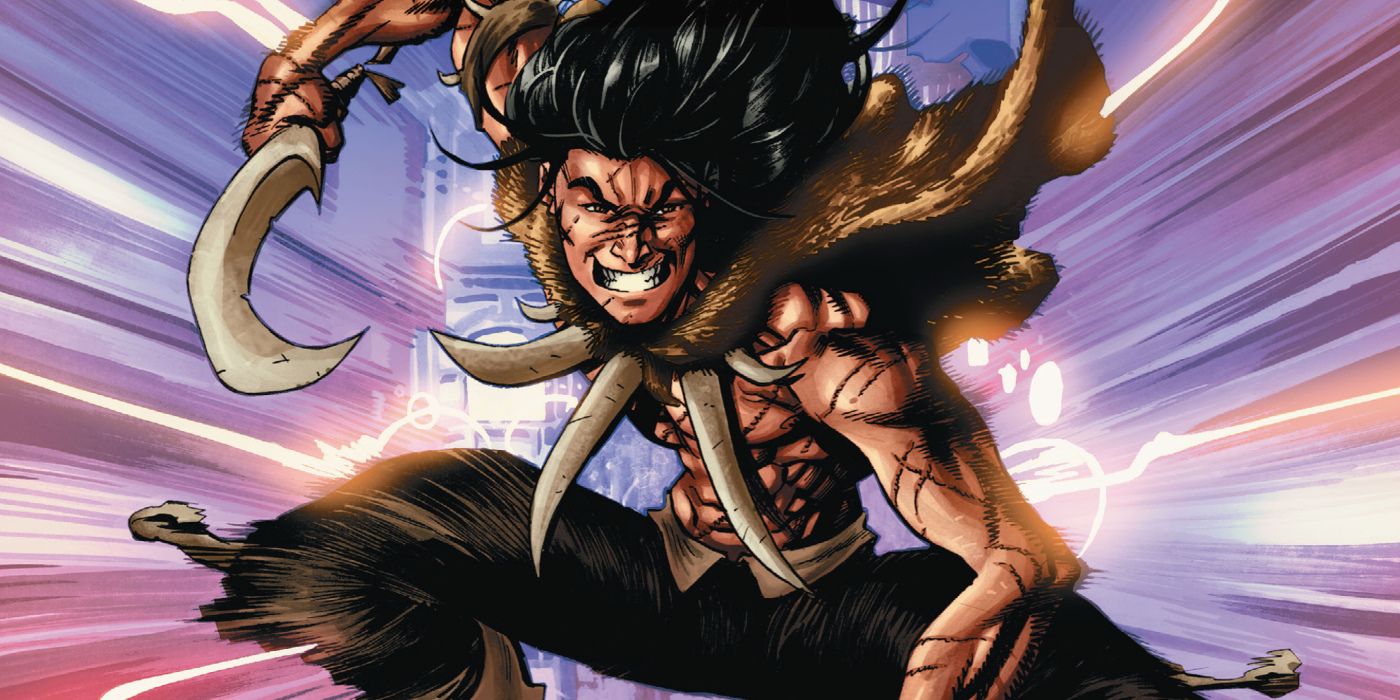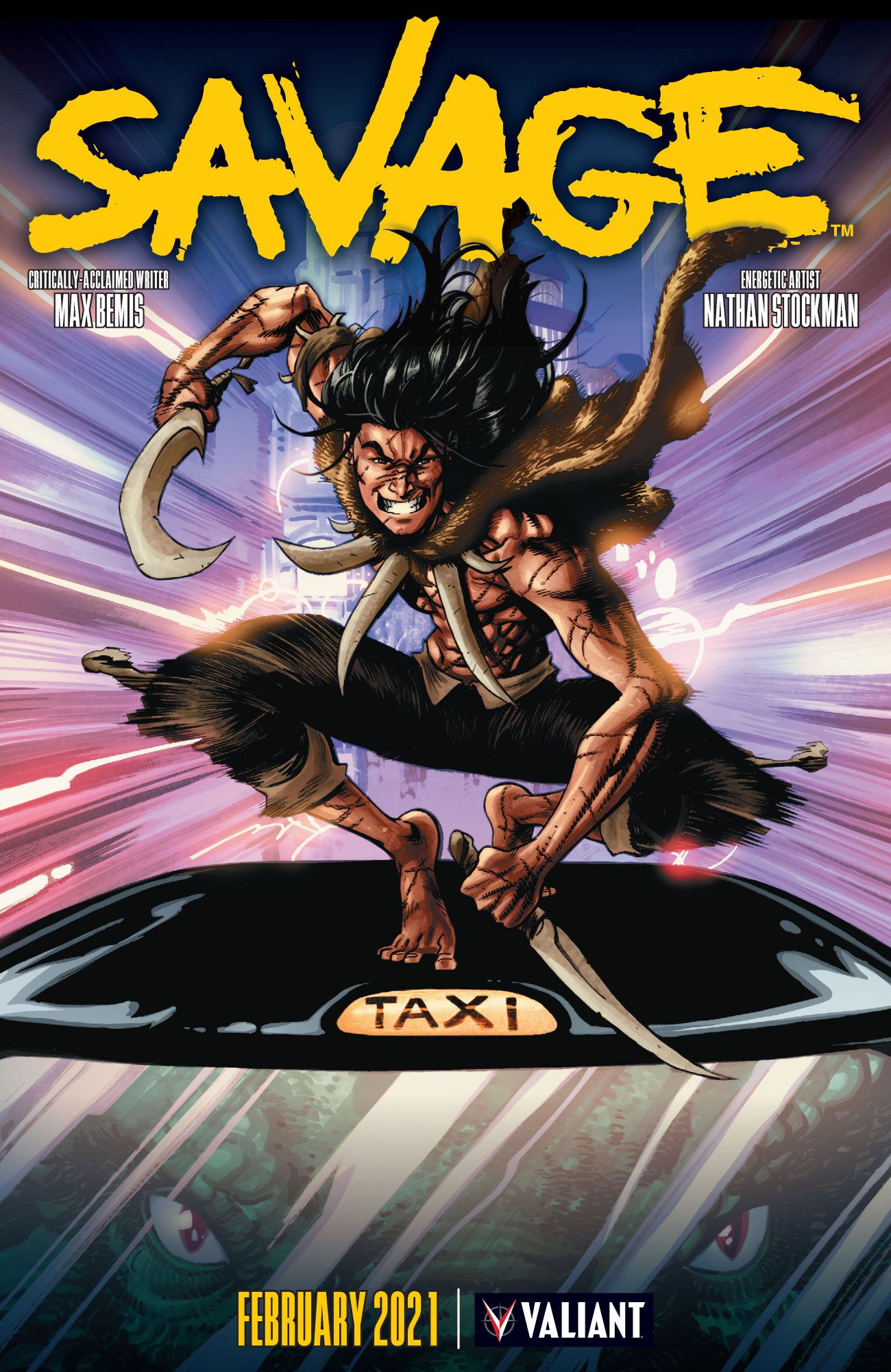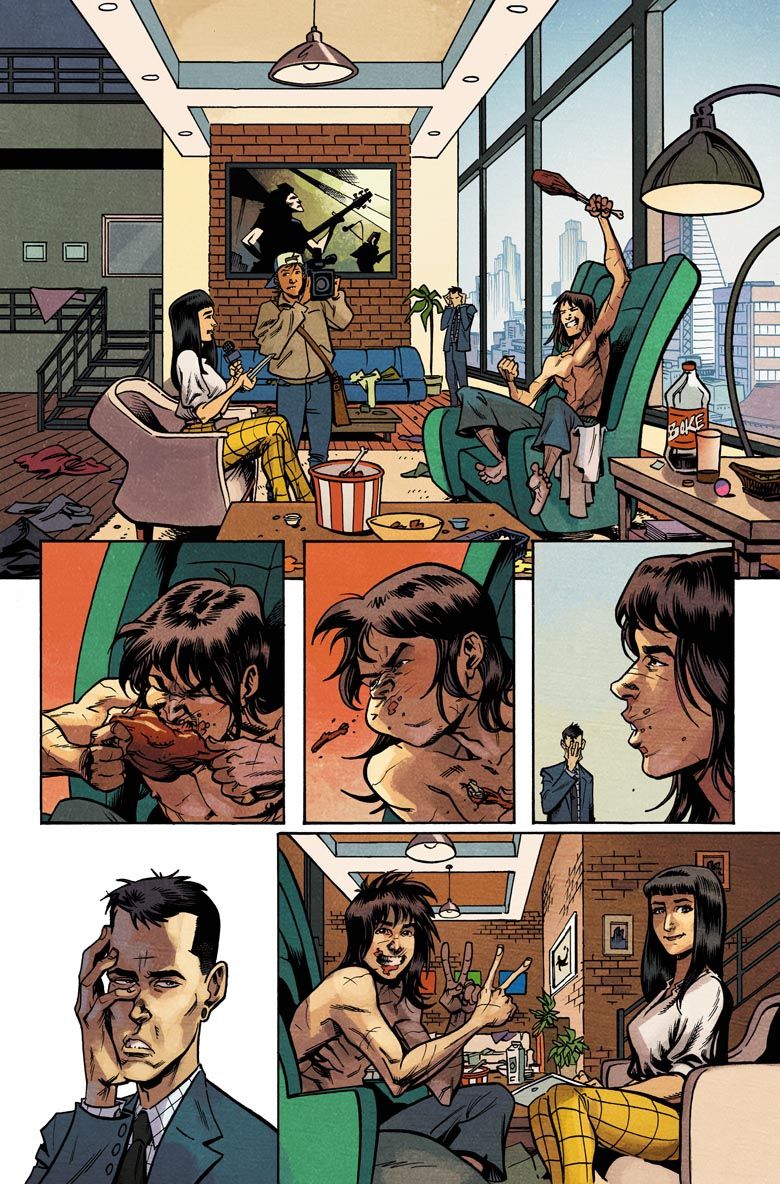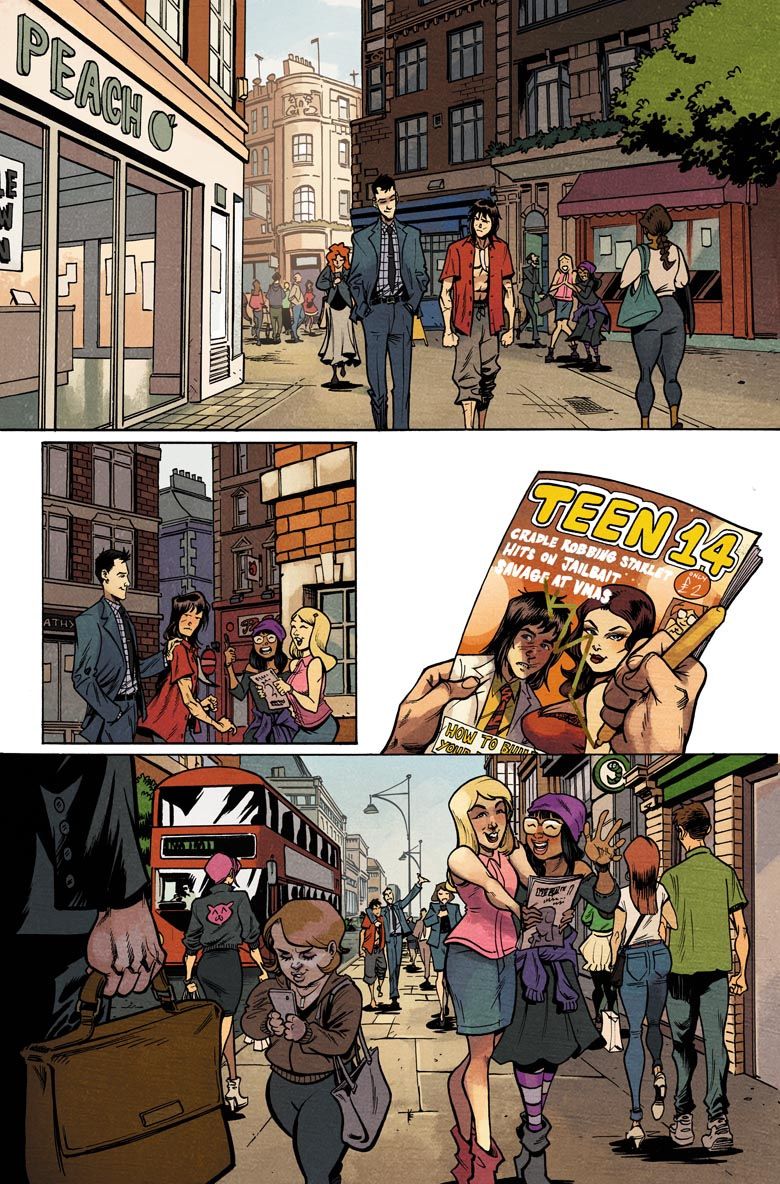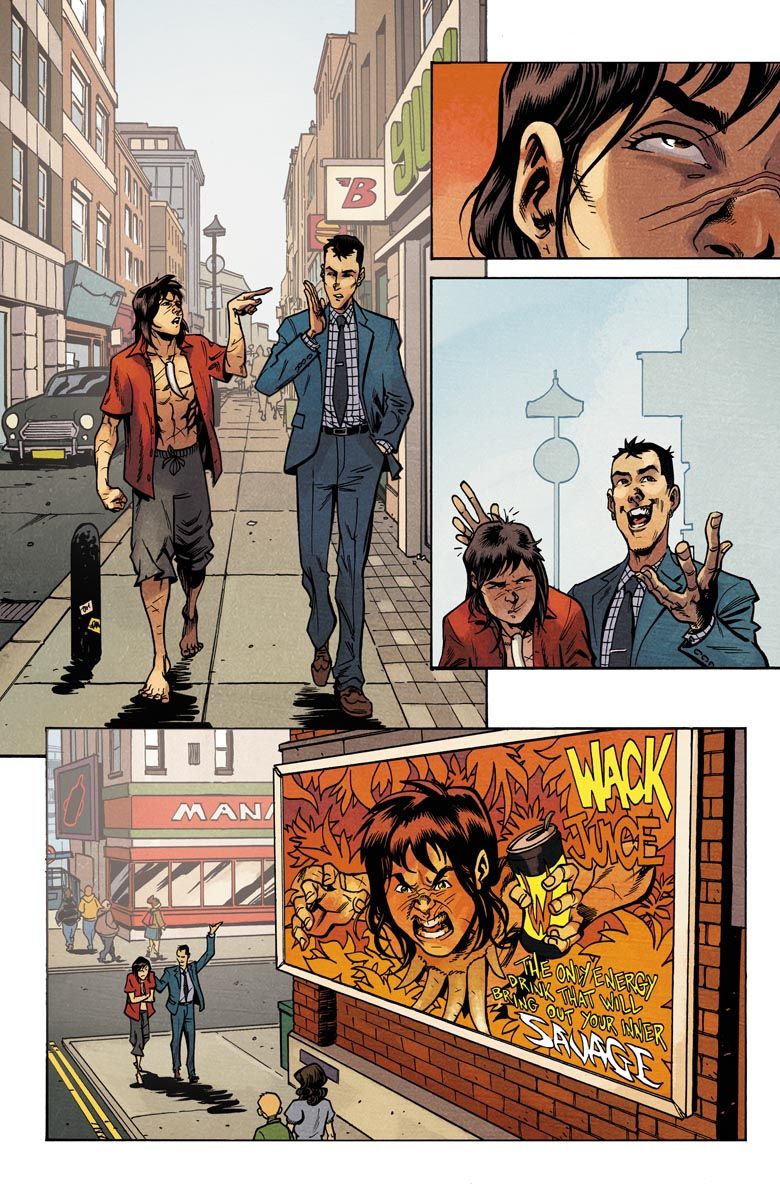With the original Savage series released in 2016, comic readers witnessed the origin story of Valiant's newest (and surprisingly brutal) hero. Now thanks to writer Max Bemis, the battle-hardened twist on The Jungle Book or Tarzan is finally returning to civilization. But if fans think they know where this story will begin or end, they are in for a massive surprise.
The tale of Savage was more than Valiant readers bargained for, delivering an unforgettable origin in just four issues, a David Beckham-esque footballer, his supermodel wife, and their newborn son were inexplicably marooned on a deserted island. Hunted by deadly dinosaurs and similarly-stranded bandits, the baby--Kevin Sauvage, Jr.--must become the apex predator to return home. But while B. Clay Moore, Clayton Henry, and Lewis LaRosa told the original tale of Kevin's childhood, the task of continuing his story is one perfectly suited to writer Max Bemis and artist Nathan Stockman. And after hearing what Bemis has in store for Savage #1 when it arrives February 17th, there is no telling where this journey will head next.
With the series concluding by sending Kevin Jr. back to the heart of London, the fresh kill of the bandit leader still in his arms, it would seem obvious where the next chapter must begin. But the past work of Max Bemis is anything but obvious. Instead, Savage #1 leaps months ahead of Kevin's shocking arrival, when he has become a breakout viral sensation known to the world as "Savage The Wild." And as the newly christened Savage learns to live in his new environment, a taste of home comes to London as dinosaurs invade the city! It’s time for Savage to do what he does best: hunt! Screen Rant readers can find our full interview with Max Bemis below.
Screen Rant: Many comic fans will know you from your previous indie work, and with Marvel Comics, but I'm curious to know where the road to this new Savage story began with Valiant?
Max Bemis: I think it initially came from me harassing Valiant for a long time about giving me [something]. I'm obsessed with Valiant, and I've been trying to work at Valiant for some time. They've always been great, and we've been in talks for a certain amount of time. Then Heather Antos, who edited some of my books at Marvel, came to Valiant and we started talking again. The first book to come up that was the right fit was Savage.
What was it about Valiant that got its hooks into you?
Max Bemis: As a reader, I've always been a fan of both superhero books, and also esoteric stories that people sort of deemed to be "smart person comics." And I think that Valiant is unique in that pretty much everything they put out is a mixture between something ambitious and out of the box, and then exciting action or superhero stuff.
I think there are books like that at the big two and stuff like that, but at the same time, I think that's kind of exclusively what Valiant does. There's nothing too obvious ever done at Valiant. I read Valiant Comics as a little kid, but especially since the relaunch, I've read pretty much everything. As a creator, I always get psyched to contribute to a mythos or a world that I'm attracted to more than anything.
SR: Everyone I've spoken to who is involved with this latest wave of Valiant books speaks about the spirit and the energy with those characters. Did you know, when you were working on this, what other books were being developed around you?
Max Bemis: Yeah. We weren't as focused on that, but only because of COVID and stuff like that. It really threw a wrench into everything. I think it was gonna come out a year ago. I would say normally that I would be more keyed into that, but not just because of that.
SR: This new series is picking up where the previous introduction to Savage left off. Had you read those comics beforehand, or did you come to them for this project, and what did you think?
Max Bemis: I did, and I loved it. Just like with anything I do, where I take on a licensed property, I think it was both awesome and enough of a starting point, instead of a tonal commitment. I was able to take it into a more extreme tonal direction without it being like I'm stepping on someone's toes already because it had its own strong narrative or genre identity. I think it was a really well-written, awesome action book. So, what I tend to do is want to take it in some more bizarre direction. And we were able to do that.
SR: Having read the first issue of the new series, it made me realize that the first series felt like the opening of a first act.
Max Bemis: Exactly. It was a great origin story, and like any great origin story for any superhero, you look back and at the time it feels like, "Oh, this is it." But then you think of what sprang from it. If you think about the movie Iron Man, that's a completed thought. But at the same time, that's the beginning of... God knows at this point.
SR: When people see that a new series is coming out, either they've read the first series and think, "Oh, my God. Finally!" Or they haven't and think, "I know exactly where this is going to start." Was that a conscious decision?
Max Bemis: Yes, you can jump in that way. I feel like it should be set up that way. When it's my parents or someone ask, "What's this new comic you're working on?" I'll just be like, "Oh, it's kind of about what happens after The Jungle Book, when Mowgli is sick of human society." That in and of itself, I think, is a funny and sort of interesting concept that you don't necessarily have to have read the first act to jump onto.
Same with any sort of arc of a superhero story. Unless there's a concept like 100 bullets, where you have to have read every issue to appreciate it, or something like Preacher, where I feel like you should be reading those books from the beginning, because it's a serialized and ongoing narrative. A lot of superhero books should be, I think, almost a soft reboot every time you change creative teams.
SR: Was that inspiration for a story received well? I know that a lot of people will think that is an editor's nightmare.
Max Bemis: No, they love it. Because then then it's easier to sell to people. I don't mean to sell like "make money," but it's easier to get people excited about it. You don't have to be like, "Coming off the last miniseries, which came out five years ago," and people have to scramble to pick that up, like with The Wicked + The Divine or something like that. This is kind of like, "Okay, start here." It is really totally different and everything.
Someone who reads this and then goes back to the first Savage will probably love it, but it's certainly not essential reading for enjoying this new arc. I think that's actually the opposite of an editor's nightmare, in this case. They're like, "Okay, cool." It should all be inherent in the first issue to some degree.
SR: It almost injects a wry sense of humor in this. It's easy to remember where the original Savage ended, but where it started was still very much in there, with this archetypal story taking place in our modern world.
Max Bemis: Exactly. I love to look at these things that we take for granted, from a certain property or superhero or something like that. I worked on X-Men and Moon Might and stuff like that. And in those books, I kind of did the same thing: the X-Men book was about what it must be like to be a mutant teenager amongst other mutant teenagers. There must be like a social hierarchy, and there's probably some cool kids and kids with lame powers - because that must exist in the world of X-Men, it's just probably something that we don't necessarily examine much. Moon Knight was about what it's like to be in Mark Specter's head, and thinking about him being a guy who dresses up and puts on this costume, and how crazy that is. It was more focusing on his mental illness than how cool it makes him.
For me, I try to look for that element that's almost obvious, but you don't think of it because it's so inherent in the genre. We could have made this way more serious, but if you were to see it on film, for instance, you would have to address those thing because it becomes more hyper-real. So, I try to kind of integrate that into the comic storytelling.
SR: I love the way that you took those pieces from the original series and show them in a new light. I think it is tempting for people to see that, any time a comic comments on or even replicates parts of reality, they assume it's in bad faith. But I feel it's not that simple a creative direction, and I feel more in common with Kevin Jr. than I expected to.
Max Bemis: Yeah, of course. He has passion, and he has love for what he does. He's not necessarily the butt of the joke. It's more like we are the butt of the joke. Society is the butt of the joke, and we're seeing it from his outsider perspective. Of course, he's kind of sick of it and yearns for a purer reality, which we all do. We yearn for our childhoods.
That's ultimately what the story is about: him letting go of his idealization of his childhood. Even as adults, we find ourselves going, "What the f*** has my life become?" Especially with COVID, you're like, "I remember when things were good. God, get me out of here." And without picking too much on on politics, I at least felt when Trump was in office, "What is this? I remember when we had a president." Even when George W. Bush was President, I didn't feel like this. Take me back there.
I think it's about maintaining the enthusiasm that you have for the things you love as a child, and the wonder of that era, but then letting go the fact that it has to be exactly the same for you to not feel uncomfortable. Ultimately, he has to learn to either integrate or not. And that's kind of the journey.
That whole first book is so cool. He gets to be the hero, he fights the bad guys, and he has the tragic arc with his parents. It's very much a teenage fantasy in a really cool way. Our book is what comes after the teenage fantasy, which is sort of its own thing, and that's why I think you could start with our book. Although I really would encourage anyone to read the last mini, because it's great and beautiful-looking and all that stuff.
But the high concept of our book is, "What comes after Encino Man?" You know, you don't have to necessarily see Encino Man to know the concept of this fish out of water story that we've told 1000 times. All these things where someone's taken out of a very pure society, and then they're just getting sick of it. We're attracted to those stories, where we love their idealistic lives, but at the same time we want them to come into our world. "Come here. It's all good. Integrate, it's good." But then what happens? How does Ariel like deal with being on land after being a mermaid?
SR: Lest anyone get the wrong idea about this book is: in this version of the story, you take the boy out of the jungle, but the jungle follows. How early in that pitch did you think, "This is the idea I have for it"?
Max Bemis: From the beginning, because I didn't want to strip the excitement away from the first one. I didn't want to go full ironic and make it not a fun book to read, and not show what he's so good at, which is fighting. I think that it also serves as a temptation; it's not just that he's sick of society, it's that he gets an out in a way. Basically, dinosaurs start attacking London, so he gets this out, which he can pursue. It's almost his way of escaping. There we go. He's in his element again.
But at the same time: how long did that last? Obviously, his goal is to get rid of them. Once that happens, what's he gonna do? He's tempted by external forces that are introduced at the end of the first issue, and other people involved in the in the story will be trying to tempt him to kind of be sucked back into his earlier life. Some people will be trying to get him to develop and move past it. It's the impetus for that struggle rather than being just stuck in his job as almost a social media influencer. He's in a situation where he can kind of strut his stuff, but is that what he wants? Once he gets what he wants, is he going to choose to sabotage himself or is he going to save the world? Because in a way that would imply that he's gonna go back to his boring life.
SR: Nathan Stockman really was the guy for this, because there are no seams or even a hint that there are different stories all in one place. This is one expression.
Max Bemis: Yes, exactly. I definitely knew from the beginning, especially once I started seeing layouts and pencils come in. I'm like, "Okay, now I don't have to worry about anything I do whatsoever in this book," because I think he grasped the tone so quickly. It's just a light-hearted exploration of extreme violence; that's how I would put it. There's parts where Savage is straight up splitting dinosaur skulls, and he's covered in blood.
But for some reason, it feels PG-13. It doesn't feel like you're taken out of that whimsical feeling. I think it's almost part of it, because you're seeing it through his eyes. Through his eyes, it's this hobby. It's a fun thing for him to jump around and kill monsters.
SR: I will not spoil the end of the first issue, because I want everybody to have the experience I did. But it seems like it will be even more surprising as the story goes on. I read that page, put my hands down and said, ".....WHAT?!"
Max Bemis: [Laughs] That's the goal. It's rare that I hear that actually happens, because it's always what I'm trying to do. I'm glad it worked. I'm always trying to "WTF" people - I think it's literally a term that people use, the WTF moment. I feel like I sort of depend on those as a writer, because they're fun.
SR: I did not expect Savage was going to have an almost 'Nick Fury moment' that implies the story to come is due for a shift and the scope is going to get a lot bigger.
Max Bemis: It's not just him fighting dinosaurs. He's technically from an alternative universe. Or not from, but he was raised in an alternative universe. I wouldn't miss out on that kind of cool thing, to make that attractive to other people and to make it a part of the story. It's not just that he comes from an island somewhere; he comes from some other world that people are not familiar with. What does that imply?
Because that's not been a thing in his life thus far. I don't want to spoil it either, but that will heavily factor, for sure.
SR: What can you say about the rest of the story, in terms of how it relates to this opening?
Max Bemis: Basically, it just continues and takes the theme of his exploitation to a more logical extreme. If you've read the first book, and then start reading ours, it actually makes sense as to this theme of society and our generation trying to exploit this fish out of water. That's a big theme in the book, and he has so much to be exploited, whether that's as a sort of soldier without a war, or a kid genius. And the fact that he's from another universe.
He's essentially being used by a lot of people, and we continue to explore how he can break through those shackles, while also learning to love our world to some degree and realize he's human. It's kind of a war between the establishment using him, and then him learning to not necessarily see that everyone's part of the establishment. So, there'll be other characters that aren't necessarily just assholes trying to mess with Savage. There'll be people who are actually worth his time, and he has to learn to distinguish between them: allies and enemies, and some people he wouldn't think would be enemies that secretly are.
Even though he's a Wolverine-esque, jaded character, he also has no knowledge of social niceties. He may be mistaken or naive, and he basically has to go through the steps we all go through where you can distinguish who's a friend and who's not; who has your best interests in mind and who doesn't. Obviously, he's a focal point of a lot of interest - not just from social media and his generation, because he's like Justin Bieber to some degree - but from the scientific community and from kids his age and all that stuff. And I think we address a good amount of that stuff.
SR: Knowing the first series, your book subverts it in a really fun way.
Max Bemis: My favorite books are like that, and that doesn't diminish the original work. Swamp Thing being, to me, the archetype of everything I do - Alan Moore's Swamp Thing or Neil Gaiman's Sandman. They both inherently had a lot of respect for the material that came before. It's just that they knew in order to expand upon it, and express their ideas and do something interesting, sometimes you really do have to take a hard left.
If I do have one quality that I want readers to be able to expect, that might be it. You're not necessarily going to maintain the exact same tone of something that came before, unless it's something that already is my tone. And there's not that much, I guess. Most of the stuff that is of my tone is creator-owned work.
But then again, I feel like as a superhero reader, my favorite stuff was always like that. Like Ultimate Spider-Man, when Bendis launched that, it was a hard left. Just the fact that it was pages and pages of internal teenage monologue, and this is like, "What is this?" But then you go with it, and it's like, "This is what I always wanted from Spider-Man." For me, that's always the goal.
Savage #1 arrives in your local comic book shop, and digitally on February 17th, 2021.

